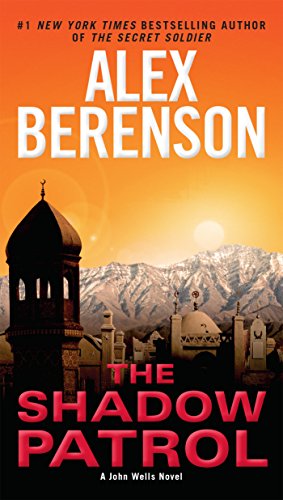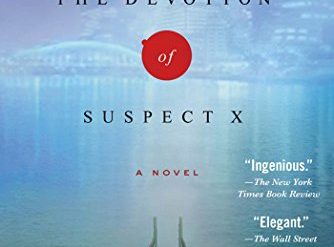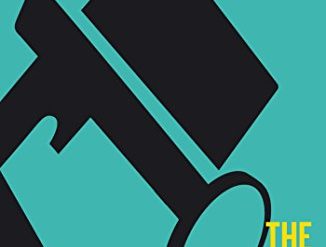
The cottage industry in spy thrillers encompasses a wide range of quality, from those that offer up cheap thrills with one-dimensional characters facing off in unreal circumstances to those, many fewer, that rise into the realm of literature, illuminating the human condition. The finest of the lot, such as Graham Greene and John Le Carre at their best, stand with other exemplars of modern fiction. Alex Berenson‘s writing doesn’t quite measure up to them, but it comes close. His most recent novel about the adventures of soldier-spy John Wells, The Shadow Patrol, explores the tragic dimensions of the U.S. war in Afghanistan, from which no one leaves ennobled.
John Wells has left the CIA and his long-time love, his agency handler, Jennifer Exley, and is living in rural New Hampshire with Anne, a local cop. When his old CIA boss, Ellis Shafer, asks him to return to action in Afghanistan, where he spent so many years undercover inside Al Qaeda, Wells leaps at the chance. The agency’s Kabul station is in crisis. A Jordanian physician, having established a credible cover as an ally, has murdered the CIA’s top brass in the country by setting off a suicide vest. Now, in addition to the chaos that results when replacements for the top officials prove unequal to the task, reports have surfaced that the station has been penetrated by a Taliban mole. Wells’ assignment, to learn the identity of the mole, brings him and the CIA into conflict with the hierarchy of the Special Forces and eventually into a one-on-one test of wills with a Delta sniper who holds the key to the mole’s identity.
The Shadow Patrol (John Wells #6) by Alex Berenson (2012) 402 pages ★★★★☆
Returning years after his last visit to Afghanistan, Wells finds the country, the war, and the agency, all profoundly changed by the billions of U.S. dollars spread about the countryside and the years of unrelenting killing. Cynicism and greed have spread throughout the country like a virus.
When Wells checks into the CIA station in the capital, a senior officer tells him, “First off, understand the strategic situation’s a mess. We’re playing Whac-a-Mole here. First we had our guys in the east, and the south went to hell. Now we’ve moved everybody south, and the east is going to hell. And by the way, the south isn’t great either. This quote-unquote-government we’re working with, it’s beyond corrupt. Everything’s for sale. You want to be a cop? That’s a bribe. Five to ten grand, depending on the district. . . to become a patrolman. You want to be a district-level police chief? Twenty, thirty thousand. At the national level, the cabinet jobs are a quarter million and up.”
While there’s nothing in this monologue that we haven’t learned from news reports and the numerous nonfiction books about the war, this matter-of-fact informality drives home the point more clearly than any “objective” report could do. In fact, Alex Berenson was a New York Times reporter before he turned to full-time writing. As a reporter, he covered the occupation of Iraq, among other big stories, and he brings a reporter’s instinct for news and the value of obscure details to make a story come to light. In The Shadow Patrol, the intimate conversation and inner dialogue of American troops highlights the mind-numbing reality of war much more clearly than any nonfiction account could possibly do.
A revealing passage
One of the most revealing passages in the book comes in the course of Wells’ conversation with the same CIA official who spoke of the corruption caused by the influx of U.S. dollars. Wells has asked “So how many officers do you have?”
“We’re close to full strength now. Six hundred in country.”
“Six hundred?”
“But you have to remember, only a few are case officers. More than two hundred handle security. Then we have the coms and IT guys, logistics and administrative . . . and the guys at the airfields, handling the drones. Fewer than forty ever get outside the wire to talk to the locals. Of those, most are working with Afghan security and intelligence forces. If you’re looking at guys recruiting sources on the ground, it’s maybe a dozen. . . . The security situation is impossible. Only the very best officers can work outside the wire without getting popped, and even then only for short stretches.”
This is today’s CIA.
Berenson has devoted significant effort to researching the agency, the reality of the war in Afghanistan, the heroin trade, the art of the sniper, and other elements in this clever and compelling story. The Shadow Patrol — the sixth in Berenson’s John Wells series — is a superb contemporary thriller that delivers both an exciting tale and down-to-earth reporting on the Afghanistan war.
For additional reading
For links to my reviews of all the John Wells novels, see The 12 novels of Alex Berenson’s thrilling John Wells spy series.
You might also enjoy my posts:
- The 15 best espionage novels
- Good nonfiction books about espionage
- The best spy novelists writing today
- Top 10 mystery and thriller series
And you can always find my most popular reviews, and the most recent ones, plus a guide to this whole site, on the Home Page.


























